Texas
“Stop grooming the kids,” right-wing protests Dallas Drag event at gay bar
The organizers of the drag event billed it as a “family-friendly” drag queen story hour event at Mr. Misster

DALLAS – The “Drag the kids to pride” drag show to kick off Pride month in Dallas, Texas found itself to be a flashpoint between anti-LGBTQ+ right-wing protesters, attendees of the event, and police at a popular gay bar and safe space in the city’s Oak Lawn neighborhood.
The organizers of the drag event billed it as a “family-friendly” drag queen story hour event at Mr. Misster, located at the corner of Cedar Springs Road and Reagan Street, but according to both The Dallas Voice, the local LGBTQ+ media outlet and Dallas–Fort Worth ABC News affiliate WFAA 8, protesters also showed up outside the event, some carrying signs that read “Stop grooming the kids” and “Stop exploiting kids,” and similar variations.
According to WFAA ABC 8, During the event, drag performers danced and walked down the aisle in the center of the room. At times, the dancers would take dollar bills from some of the children. Kids also walked with the dancers down the aisle during the event.
Cannon Brown, a Dallas LGBTQ+ activist and founding former head of the Dallas Stonewall Young Democrats took to Facebook posting pictures of the protestors captioning the post with “Christofascists on Cedar Springs in front of Mr Mister. Get down here.”
Photos posted by The Dallas Voice journalist Tammye Nash, using photos by Chad Mantooth, show one protester carrying a sign declaring “confuse a child, abuse a child,” and another had a sign shouting “stop groomers.” Yet another demands, “Stop exploiting our kids.” And, in what is apparently a swipe at the rainbow power of Pride Month, one woman wore a black T-shirt with a block of rainbow colors saying “rainbow revival.”

One woman who was protesting, Dasy, who didn’t want to give her last name, told WFAA ABC 8 that she first saw the poster for the event near where she lives. She was at the bar after the event with a “Stop grooming the kids” poster.
“I live in this community,” Dasy said. “I have for several years. I don’t believe that I should be seeing signs advertising for children to be dancing on stage with men in thongs and in inappropriate clothing and makeup. I do not in any way condone the behavior that these people are engaging in, but what drags me out here is its kids now.”
A media statement the venue released after the event noted:
“We host our Champagne Drag Brunch every Saturday at 2pm for guests that are 21+ but we have partnered with some of our major community partners to host a special Pride Drag Brunch for all guests, including guests that couldn’t normally attend our regular show because of the drinking age restriction, to raise money for a local LGBTQ+ youth organization.
We are more than happy to open our doors to celebrate Pride in a family friendly, safe environment, separate from our normal operations of 2 p.m. – 2 a.m. on Saturdays because we believe that everyone should have a space to be able to celebrate who they are.
Mr. Misster is a place where everyone is welcome to feel accepted, safe and included. We had a group of protestors outside yelling homophobic threats, transphobic remarks and vile accusations at these children and parents.
It is so sad to see that in 2022, there are people that still want to protests others celebrating who they are, but our staff and wonderful officers helped keep us safe and kept the protestors at bay.
In a statement provided by the anti-LGBTQ+ group Protect Texas Kids tried to claim that Dallas Police officials had “removed” the children from the drag show, which WFAA ABC 8 reported as untruthful, a fact verified by the Dallas Police Department.
A spokesperson for the police department told media outlets that its officers showed up to “assist with crowd control” and help the crowd “disperse in a safe manner.”
“We decided to organize this protest when we saw advertising for the event a few weeks ago – we researched the bar and quickly found out that it’s a gay bar, and we were also pretty concerned when we saw the signage on the bar’s website that says “it’s not gonna lick itself.” We just launched our organization and this was our first event.
The mission was to raise awareness that an event like this, a drag show for children, was happening right in Dallas. We also hoped that if we raised awareness, the event might be canceled or modified so that children couldn’t be present.
We were very happy with how the event went overall. The police were able to come in and remove all of the children and their families from inside of the bar. There were a lot of people in attendance who didn’t have kids, so those people were able to stay and the event continued.”
According to WFAA ABC 8 Mr. Misster also said the bar had received several hundred threatening emails, nasty Google reviews and aggressive threating phone calls from protestors.
Texas
Princeton Texas Diverse group cancels Pride
The ACLU of Texas requested that Princeton ISD “immediately reverse your decisions to terminate PTX Diverse

By David Taffet, Senior Staff Writer | PRINCETON, Texas – John Kusterbeck, founder of Princeton TX Diverse, said his city’s Pride event, originally scheduled for June 29, has been canceled for now because the venue they had intended to use has canceled the contract.
Pride was scheduled to return to Princeton ISD’s high school, but the school district canceled use of the venue for two reasons: the organization failed to include a disclaimer and it has been distributing banned books.
The ACLU has filed a complaint on behalf of the group based on the fact that the group has consistently included a disclaimer in promotional materials that the event is not sponsored by the school district and the fact there is no list of banned books.

Princeton is a fast-growing Metroplex suburb, located 30 miles northeast of Dallas near the center of Collin County. The population at the time of the 2010 census was just over 6,000. Today it is about 26,000. And that population includes a large number of LGBTQ residents.
Several hundred people attended last year’s Pride celebration that took place in a Princeton ISD school, organizers said.
Because the first Pride event was so successful, Kusterbeck reserved the school for this year’s Pride. But then he received a letter from Princeton ISD Superintendent Donald McIntyre canceling the agreement.
“Board policy,” McIntyre wrote, “clearly states that any and all communications with the public by the lessee shall clearly state the event is not sponsored by the district as well as identify the nature of the activity and sponsoring organization.”
Kusterbeck was careful to include a disclaimer on all information about Pride. However, in a Facebook post after the event thanking the board president for her support, no disclaimer was attached. The post was facetious since the board president had done everything she could to NOT support the group.
“Therefore, based on this information and the terms of the agreement that specifically provided that ‘violation(s) of rules and regulations for use of district facilities may result in permanent cancellation of the non-school user’s use of district facilities,’ you and Princeton TX Diverse are no longer able to rent and utilize district facilities,” McIntyre wrote.
In its complaint against the school district, the ACLU found that the policy has not affected the relationship between Princeton ISD and several churches that meet on school property.

“For example, the Heart+Soul Church hosts worship services at Princeton High School and has often failed to include the required disclaimer in its social media post about these events, even when prominently advertising that its services take place on district property,” the ACLU wrote in its complaint. Examples from three
Instagram posts accompany the assertion.
The church lists the address of Princeton High School as the place where the church worships, but there is no disclaimer.
Holy Ghost Ministry holds services at Southard Middle School and has a physical sign announcing the location of its services. Missing from the sign is the required disclaimer.
Faith Baptist Church held a National Day of Prayer celebration at Lovelady High School, which it promoted on Facebook. No disclaimer ran on the Facebook page or the event registration page, the ACLU found.
Faith Baptist Church charged from $25 to $800 to reserve seats and tables at the event. That is a clear violation of Princeton ISD’s prohibition on charging admission to events on their property.
In its complaint, the ACLU notes that it is not asking the school district to cancel use of its buildings by these churches. Instead, the ACLU simply wants Kusterbeck and Princeton TX Diverse to be treated equally.
In addition, the school district charged Kusterbeck and Lee with distributing “inappropriate material at a Lion’s Club event” that took place on school property.
“Specifically, it has come to my attention that you had a basket of ‘banned books’ with inappropriate reading materials for children under the Princeton ISD Board Policies and intended to award this basket to winners of the coloring contest,” McIntyre wrote in a separate letter.
Among the “banned books” were And Tango Makes Three, the true story of two male penguins who hatched an abandoned egg and raised the chick at the Central Park Zoo in New York.
So Kusterbeck filed a “Request for Information” form: “I would like a list of all books that have officially been banned from Princeton ISD libraries,” he requested under “Public information requested.”
In responding, Officer for Public Information Jean Ann Collins checked off a box that read, “The information you requested does not exist.”
Despite a banned book list not existing, McIntyre threatened to have Kusterbeck and Lee removed from any school property and charged with criminal trespass.
“The district’s letter fails to explain what board policies were violated, if any, by the distribution of so-called ‘banned books’ when no books are actually banned by the district,” the ACLU pointed out.
Kusterbeck noted that on the most extensive banned book lists circulating and being cited around the state, more than half of the books challenged have LGBTQ or racial content. However, the Bible is also included on the lists on the grounds that it includes violent and sexual content. Yet at the city’s Onion Festival, which took place on school grounds, one vendor distributed Bibles.
In addition to asking for an apology, the ACLU requested that Princeton ISD “immediately reverse your decisions to terminate PTX Diverse, Mr. Kusterbeck’s and Ms. Lee’s equal access to Princeton ISD facilities, including their ability to serve as vendors and to rent district property, in accordance with each of the neutral rules established by the district.”
They also request, “that you provide training to all district personnel on the First Amendment and on LGBTQIA+ cultural sensitivity.”
******************************************************************************************

David Taffet is the Senior staff reporter for the Dallas Voice newspaper, the leading source of news in Texas for the LGBTQ+ community. He is also host of Lambda Weekly on 89.3 KNON-FM, in Dallas, on Sundays at 1 p.m. Taffet also serves as the Secretary of Congregation Beth El Binah.
******************************************************************************************
The preceding article was previously published by the Dallas Voice and is republished with permission.
Texas
Texas AG Ken Paxton sues to stop new gender identity guidelines
Texas Attorney General aims 75th lawsuit at Biden Administration this one to halt compliance of gender identity mandates in the workplace
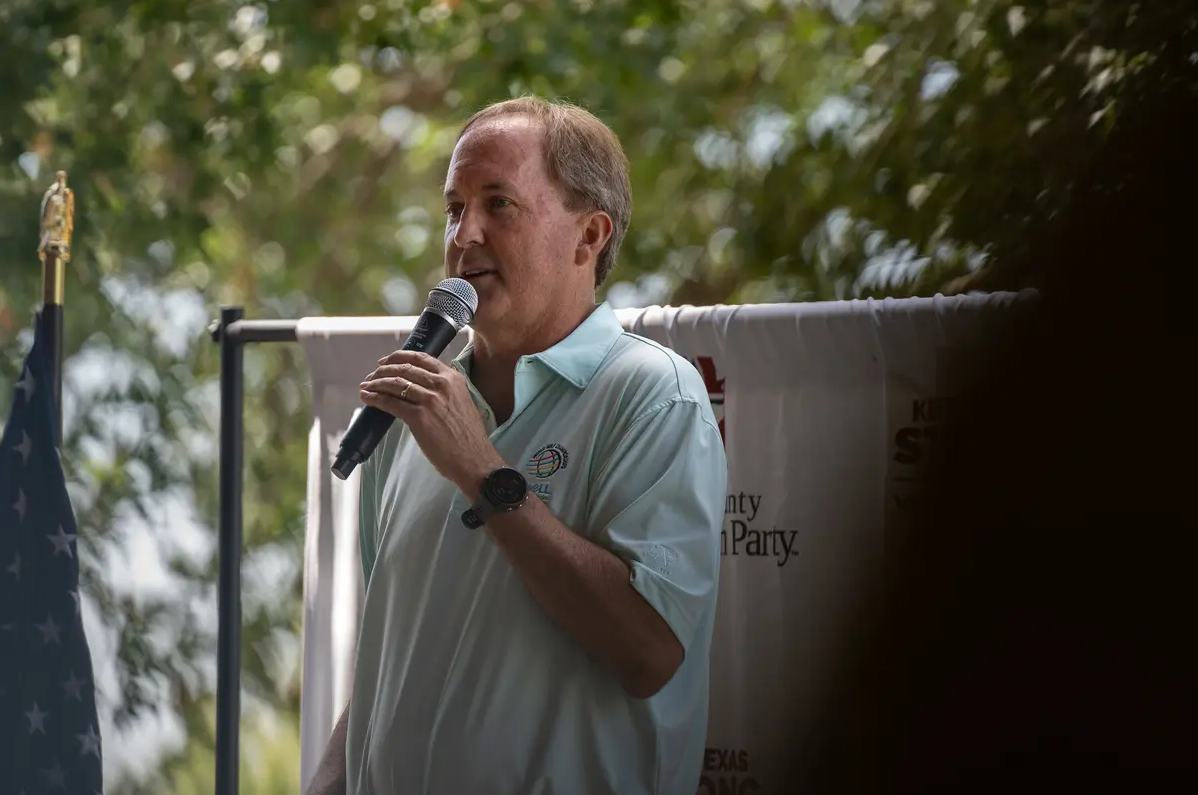
By Nina Banks | AMARILLO, Texas – Attorney General Ken Paxton is suing the Equal Employment Opportunity Commission and members of the Biden Administration to contest LGBTQ+ workforce protections.
The guidance, released last month, states that denying an employee accommodations for their gender identity, such as prohibiting an employee to use the bathroom of their gender identity, is unlawful workplace harassment. The guidance isn’t legally enforced and instead it serves to distinguish what constitutes harassment under the EEOC.
The lawsuit filed on Tuesday argues that the EEOC specifically targeted Texas with its new guidance, as some Texas employers do not have to comply with federal policies meant to prohibit discrimination. Paxton claims the guidance would force Texas to reevaluate its agencies, causing “irreparable harm” to state finances and sovereignty, and redefine “sex” under the Title VII of the Civil Rights Act of 1964.
“Yet again the Biden Administration is trying to circumvent the democratic process by issuing sweeping mandates from the desks of bureaucrats that would fundamentally reshape American law,” Paxton said in a statement. “Texas will not stand by while Biden ignores court orders forbidding such actions and we will hold the federal government accountable at every turn.”
This is Paxton’s 75th lawsuit against the federal government since Biden was inaugurated in January 2020. Paxton has long portrayed himself as the bulwark against Biden’s agenda and has positioned Texas at the forefront of the largest conservative legal battles of the day.
This lawsuit parallels a motion from October 2022 where Paxton sued the Biden administration over a 2021 EEOC guidance that explained the parameters then for gauging harassment and the Supreme Court’s stance on Bostock v. Clayton County, which prohibits discrimination on the basis of sexual orientation or gender identity.
A longtime adversary to gender-affirming policy, Paxton claimed the 2021 guidance forced the Biden Administration’s “political agenda” onto Texas. In that case, the U.S. District Judge Matthew Kacsmaryk ruled in favor of Paxton, concluding that the Biden Administration’s protections for LGBTQ+ employees were too extensive.
Paxton filed this lawsuit, like many of his legal challenges, in Amarillo, where one judge hears nearly all cases—Kacsmaryk.
Kacsmaryk was appointed to the bench by President Donald Trump as the first judge appointed directly from a religious liberty law firm. Kacsmaryk previously worked at First Liberty, a Plano-based conservative Christian law firm, where he frequently litigated cases involving abortion, contraception and gender identity.
Reporter Eleanor Klibanoff contributed to this story.
******************************************************************************************
/https://static.texastribune.org/media/profiles/Nina_Banks.jpeg)
Nina Banks is the Tribune’s Dallas Press Club Foundation reporting fellow based in Arlington where she is studying communications at Tarrant County College. She is managing editor of the student-run newspaper, The Collegian, and hosts the staff’s podcast, The First Draft. When Nina isn’t hunched over her laptop, you can find her sipping on boba tea.
******************************************************************************************
The preceding article was previously published by the Texas Tribune and is republished with permission.
Your donation to The Texas Tribune will help investigative journalism that impacts state policies and politics. It is the last week of our Spring Member Drive, and our newsroom relies on readers like you who support independent Texas news. Donate today.
Texans need truth. Help us report it.
Independent Texas reporting needs your support. The Texas Tribune delivers fact-based journalism for Texans, by Texans — and our community of members, the readers who donate, make our work possible. Help us bring you and millions of others in-depth news and information. Will you support our nonprofit newsroom with a donation of any amount?
YES, I’LL DONATE TODAY
Texas
Second Texas school district investigated re: gender identity policy
Katy ISD’s board voted to require staff to notify parents if their child wants to use a different pronoun or identifies as a different gender
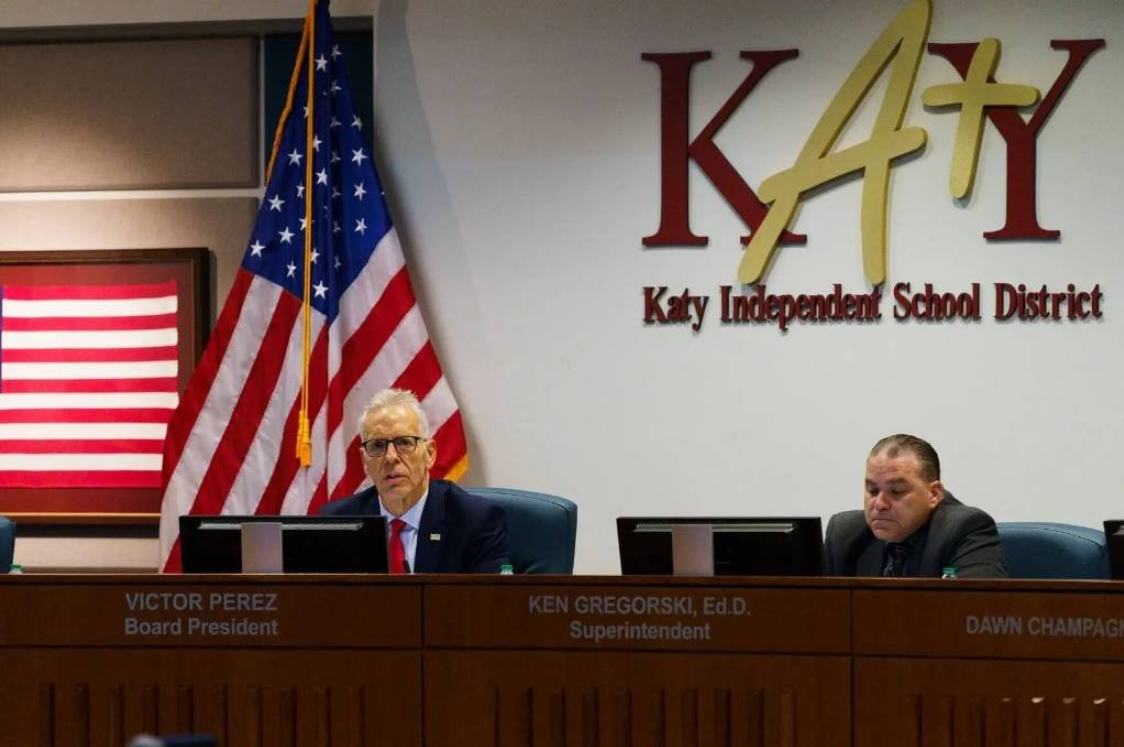
By Nina Banks | KATY, Texas – The U.S. Department of Education’s Office for Civil Rights opened an investigation Monday into Katy Independent School District’s gender identity policy on the basis of gender harassment under Title IX. The investigation came nine months after the district adopted a policy that notifies parents if their child requests to use a different name or pronouns at school.
Katy ISD did not respond to a request of how many parents have been notified this year under the new policy, which requires staff to inform parents that students are transgender or ask to use different names or pronouns.
The Houston Chronicle reported in December that the district had notified parents at least 23 times since the policy was adopted.
The gender identity policy also bars schools from teaching “gender fluidity” and denies students from competing in sports with the gender they identify with, which mirrors state legislation already regulating K-12 athletics.
Students Engaged in Advancing Texas, a student-led advocacy group, filed a complaint with the U.S. Department of Education in November regarding the policy. Katy ISD graduate and member of SEAT Cameron Samuels labels the investigation as a win against the conservative policies being passed in the district.
“Elected solely on platforms to target marginalized students, far-right school board candidates accomplished exactly what they were elected to do: weaponize identity and neglect students’ educational needs,” they said.
Title IX prohibits sex-based discrimination in educational settings or federally funded activities. Gov. Greg Abbott has loudly voiced his opposition to the federal law recently ordering the Texas Education Agency to disregard the Biden administration’s expansion of Title IX.
“The district is committed to offering equal educational opportunities to our entire community,” a spokesperson from Katy ISD told the Tribune in a response to the investigation. “While we have received the OCR filing and deny any wrongdoing, we are committed to remaining fully cooperative and responsive throughout the process.”
Victor Perez, Katy ISD board president and proponent of the policy, argued that the policy was “mischaracterized” by community members as an attack on its queer and transgender students and instead relieves the burden for staff withholding information from parents. The policy was passed at a board meeting in August with a vote of 4-3 after four hours of public comment.
Alastair Parker, a member of the Cinco Ranch High School Gender-Sexuality Alliance, spoke at the board meeting in opposition to the policy.
Parker and others argued that the policy infringes on the rights of transgender kids to express themselves and opens them to potential harm if they are outed to transphobic parents or caregivers.
Johnathan Gooch from Equality Texas, a nonprofit advocacy group for LGBTQ+ Texans, said he hopes students recognize their power to report policies like this in the wake of the increasing number of legislation targeting LGBTQ+ youth.
This isn’t the first instance in Texas of a gender related policy being investigated on the federal level. Carroll ISD in Tarrant County was reported to have eight open investigations last February after it eliminated protections over race, religion, gender and sexual orientation.
There are documented mental health benefits to using preferred pronouns. A research team at the University Texas at Austin conducted a study in which they concluded that students in gender-affirming environments report 71% fewer symptoms of severe depression, a 34% decrease in reported suicidal ideation and a 65% decrease in suicide attempts.
“When students place their trust in teachers and school administration, the school has a duty to preserve that trust,” Gooch said. “That duty requires schools to ensure that no disclosure would place a student in harm’s way.”
Parker has been out as a transgender man since the seventh grade and is supported by his father, who he resides with. He acknowledged that this isn’t the case for many of his classmates as some have parents that are less accepting.
His teachers have gone by his preferred name and pronouns for his entire high school experience. But since the policy has been enacted, he has seen some of his peers go by their deadnames fearing that their parents would be notified.
Over the past year, other schools across the state have adopted similar policies.
Keller ISD, which is also in Tarrant County, passed a policy in late June that prevents students from using their preferred name and pronouns or using restrooms with the gender they identify with.
The policy was met with retaliation from the Texas American Civil Liberties Union, writing in a letter to the district that the policy is “deeply invasive and unlawful for school administrators to interrogate students’ private medical information in this way.”
As the end of the school year nears, Parker observed the policy being enforced at varying levels of severity by teachers. The passing of legislation or policy like this deters from the ongoing health crisis for queer and transgender youth and is wholly unnecessary, he said.
“If a child’s not telling their parents something like that, it’s for a reason,” he said. “I know that most of the people who are in favor of this are the ones who bounce off whatever their parents have told them to repeat.”
******************************************************************************************
/https://static.texastribune.org/media/profiles/Nina_Banks.jpeg)
Nina Banks is the Tribune’s Dallas Press Club Foundation reporting fellow based in Arlington where she is studying communications at Tarrant County College. She is managing editor of the student-run newspaper, The Collegian, and hosts the staff’s podcast, The First Draft. When Nina isn’t hunched over her laptop, you can find her sipping on boba tea.
******************************************************************************************
The preceding article was first published by The Texas Tribune and is republished with permission.
Disclosure: Equality Texas has been a financial supporter of The Texas Tribune, a nonprofit, nonpartisan news organization that is funded in part by donations from members, foundations and corporate sponsors. Financial supporters play no role in the Tribune’s journalism. Find a complete list of them here.
Texans need truth. Help us report it.
Independent Texas reporting needs your support. The Texas Tribune delivers fact-based journalism for Texans, by Texans — and our community of members, the readers who donate, make our work possible. Help us bring you and millions of others in-depth news and information. Will you support our nonprofit newsroom with a donation of any amount?
YES, I’LL DONATE TODAY
Texas
Gov. Abbott tells state ignore federal student LGBTQ+ protections
The new Title IX rules expanded the definition of sex-based harassment. Texas is also suing the Biden administration to block the changes

By Sneha Dey | AUSTIN, Texas – Gov. Greg Abbott ordered the Texas Education Agency on Monday to ignore a Biden administration rule that expanded federal sex discrimination protections to include LGBTQ+ students.
The Biden administration recently revised the rules for Title IX, the sweeping civil rights law that prohibits sex-based discrimination at federally funded colleges and K-12 schools. The new rules, which are set to go into effect in August, redefined sex discrimination and sex-based harassment to prevent misconduct based on sex stereotypes, pregnancy, gender identity and sexual orientation. It codifies initial guidance documents that prompted Texas Attorney General Ken Paxton to sue the Biden administration last year.
“Congress wrote Title IX to protect women. Biden, with no authority to do so, rewrote Title IX to protect men who identify as women,” Abbott wrote Monday on social media platform X.
Abbott’s order came the same day Paxton announced he had sued the Biden administration Monday to block the Title IX changes. Texas joins a growing number of Republican-led states that have berated the new rules, setting the stage for a legal fight over LGBTQ+ student protections. They say the Biden administration misinterpreted the intent of Title IX.
In its final interpretation of Title IX, the Biden administration sought to extend a 2020 U.S. Supreme Court case decision related to workplace discrimination to students. The high court ruled in Bostock v. Clayton County that Title VII, a civil rights law that bars employment discrimination on the basis of sex, applied to gay and transgender workers.
The Title IX changes also walk back rules set during the Trump administration that required “live hearings” in which students accused of sexual misconduct could question accusers in a courtroom-like setting. The Biden administration kept Trump-era provisions that allow informal resolutions and prohibit penalties against students until an investigation is complete.
The Texas Tribune partners with Open Campus on higher education coverage.
******************************************************************************************
/https://static.texastribune.org/media/profiles/SnehaDey_headshot_3x2.jpg)
Sneha Dey is an education reporter for The Texas Tribune. She covers pathways from education to employment and the accessibility of postsecondary education in Texas, with an eye on college readiness, community colleges and career and technical training. Prior to joining the Tribune, she had stints at NPR’s Education Desk and Chalkbeat. Sneha is a graduate of Northwestern University’s Medill School of Journalism. She grew up in New York and is based in Austin.
******************************************************************************************
The preceding article was previously published by the Texas Tribune and is republished with permission.
Texans need truth. Help us report it.
Independent Texas reporting needs your support. The Texas Tribune delivers fact-based journalism for Texans, by Texans — and our community of members, the readers who donate, make our work possible. Help us bring you and millions of others in-depth news and information. Will you support our nonprofit newsroom with a donation of any amount?
YES, I’LL DONATE TODAY
Texas
Texas politics leave transgender foster youth isolated
After Kayden Asher told his dad that he was trans, their relationship fell apart and the teenager entered Texas’ troubled foster care system
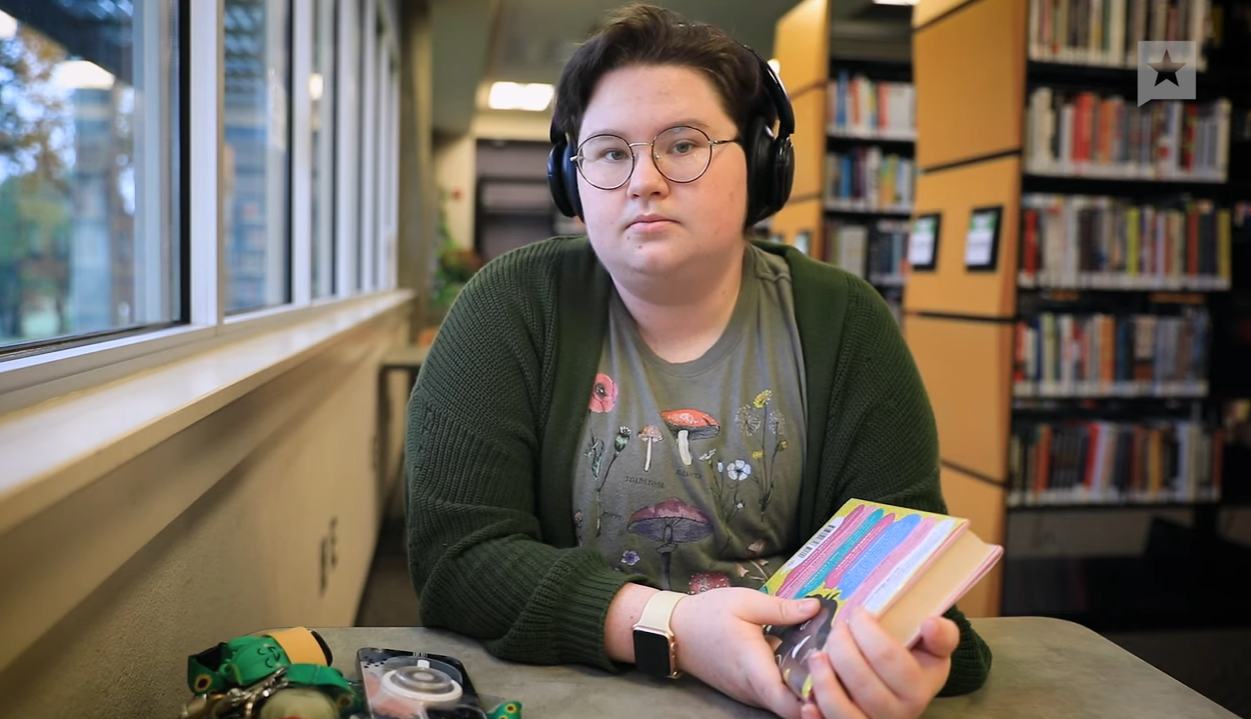
By Greta Díaz González Vázquez | AUSTIN, Texas – After Kayden Asher came out as transgender to his family and small Gulf Coast community, their rejection sent him into a spiral of mental health episodes that landed him in the care of the Texas Department of Family and Protective Services.
During his years in foster care, Asher moved between nearly 10 different placements, including mental hospitals, residential treatment centers and foster homes.
At the same time, Texas politicians intensified efforts to regulate the lives of transgender youth and banned gender-affirming care — such as hormone therapy, which Asher received while in foster care — for trans kids.
Since leaving the state’s care, Asher has pursued a degree in paralegal studies at Austin Community College with the hope of eventually working with queer foster youth who he said are increasingly isolated by state policies. But as the political climate has increased hostilities toward transgender people, Asher fears the hostility in his home state will force him to leave Texas.
Research shows that LGBTQ+ foster kids are more likely to live in group home settings, move between placements and face mistreatment. Yet Texas CPS collects little information about the sexual orientation or gender identity of youth in foster care. Asher discusses how growing up trans in Texas foster care made it more difficult to begin building a life once he aged out of the system.
Watch:
******************************************************************************************
/https://static.texastribune.org/media/profiles/Headshot2022_GDGV_02_-_Greta_Diaz.jpeg)
Greta Díaz González Vázquez was a two-time Tribune fellow on the multimedia team in 2022 and 2023. She graduated with a master’s degree in journalism from The University of North Texas, where she also earned a certificate in narrative journalism.
Greta worked as a journalist in Mexico for six years, freelancing and doing multimedia journalism for a public radio station. Her reporting is focused on gender violence in Mexico and science. Greta’s work has earned state and national awards in her home country, including the National Award for Science Journalism and the National Faces of Discrimination Award.
The preceding article was first published by The Texas Tribune and is republished with permission.
Texans need truth. Help us report it.
Independent Texas reporting needs your support. The Texas Tribune delivers fact-based journalism for Texans, by Texans — and our community of members, the readers who donate, make our work possible. Help us bring you and millions of others in-depth news and information. Will you support our nonprofit newsroom with a donation of any amount?
YES, I’LL DONATE TODAY
Texas
Texas Governor Abbott: “We Want To End” trans teachers
Abbott announced in a keynote speech to the Young Conservatives of Texas an intention to “end” trans and GNC teachers being able to teach

By Erin Reed | DALLAS, Texas – During a session at the 2024 Young Conservatives of Texas Convention held at the Hilton Anatole in Dallas this weekend, Gov. Greg Abbott stated that trans and gender nonconforming (GNC) teachers must be “ended” in the state.
This statement follows crackdowns on transgender teachers in various Republican-controlled states in the United States. Book bans, “Don’t Say Gay” legislation, and anti-drag laws have increasingly been weaponized against all transgender and GNC individuals, especially within educational settings. In Texas, many of these laws have been blocked due to being likely unconstitutional; however, this has not prevented the governor from making one of his strongest statements yet in support of overt discrimination toward transgender people.
The statement, first reported by journalist Steven Monacelli, addresses a teacher in a small town in Texas. Abbott, who repeatedly refers to the teacher as a “man dressed as a woman,” states that the teacher’s mere presence “normalizes the concept” of being transgender or GNC—a concept Gov. Abbott then asserts the state should try to prohibit. He states, “This kind of behavior is something we need to end in the state of Texas.”
Abbott said:
“Up the street from where we are right now is Lewisville, Texas. In Lewisville, Texas, in the high school, recently, as in just a month ago, they had a high school teacher who was a man who would go to school dressed as a woman in a dress, high heels, and makeup. Now, what do you think is going through the mind of the students that’s in that classroom? Are they focusing on the subject that this person is trying to teach? I don’t know. What I do know are these two things. One is this person, a man, dressing as a woman, in a public high school in the state of Texas, he’s trying to normalize the concept that this type of behavior is okay. This type of behavior is not okay. And this is the type of behavior that we wanna make sure we end in the state of Texas.”
Within hours, multiple GOP officials in Texas signed onto Abbott’s call to ban trans and GNC teachers from teaching. These include Texas GOP Chair Matt Rinaldi and multiple Texas State legislators and candidates such as Briscoe Cain and Brent Money. Their reaction to Abbott’s comments are in line with the Texas GOP platform passed in 2022 that call extensive restrictions on trans and GNC individuals in schools.
It is important to note that federal law prohibits discrimination against LGBTQ+ people in the workplace. A Supreme Court decision, Bostock vs. Clayton County, specifically stated that Title VII protections around nondiscrimination in the workplace apply to trans and GNC people. That court decision is currently being used to overturn anti-trans laws in Title IX cases in schools as well as bathroom bans, sports bans, and more.
Recent efforts have targeted transgender and gender-nonconforming individuals within state school systems. For example, Florida’s “Don’t Say Gay” legislation was recently extended to apply to transgender teachers who share pronouns or use titles different from their sex assigned at birth. This law forced a transgender female teacher to go by Mr. and use he/him pronouns in the classroom or face termination. Similarly, a nonbinary teacher was banned from using the title Mx. in school.
A recent case in the 11th Circuit Court of Appeals, however, blocked that Florida law as likely in violation of the First Amendment. Like Governor Abbott, attorneys for the state of Florida argued that transgender teachers in the classroom were a “distraction” to students and that a trans woman teacher was harming her students’ education with her mere existence and expression of her identity. The judge, however, struck down this notion, noting that the trans woman teacher had higher test scores than the district average.
It remains to be seen whether Gov. Abbott and the Republican Party of Texas will lean into anti-trans politics going into the 2024 elections. The willingness of some influential Texas Republicans to endorse Gov. Abbott’s position in the video suggests that they might. If so, there is evidence that this could harm candidates who are in tight races in the state and espouse such positions. For instance, in 2023, candidates running on anti-trans issues experienced significant defeats nationwide, including the defeat of 70% of all Moms For Liberty candidates in school boards.
Regardless of electoral consequences, the state has become harsher for transgender people in recent years. Attorney General Ken Paxton has continued to subpoena medical records of transgender individuals who cross state lines to obtain care. He has also attempted to obtain lists of PFLAG members, including addresses and phone numbers.
Abbott has not been much better: under his leadership, transgender families across the state were investigated under the premise that providing medical care for their transgender youth amounted to child abuse. This latest statement from Gov. Abbott shows an intent to continue weaponizing state powers against transgender and gender-nonconforming people in Texas.
****************************************************************************

Erin Reed is a transgender woman (she/her pronouns) and researcher who tracks anti-LGBTQ+ legislation around the world and helps people become better advocates for their queer family, friends, colleagues, and community. Reed also is a social media consultant and public speaker.
******************************************************************************************
The preceding article was first published at Erin In The Morning and is republished with permission.
Texas
Appeals court blocks Texas from investigating trans kids & families
“Texas PFLAG families are grateful the court has once again recognized the harm caused by investigating parents for loving their trans kids”
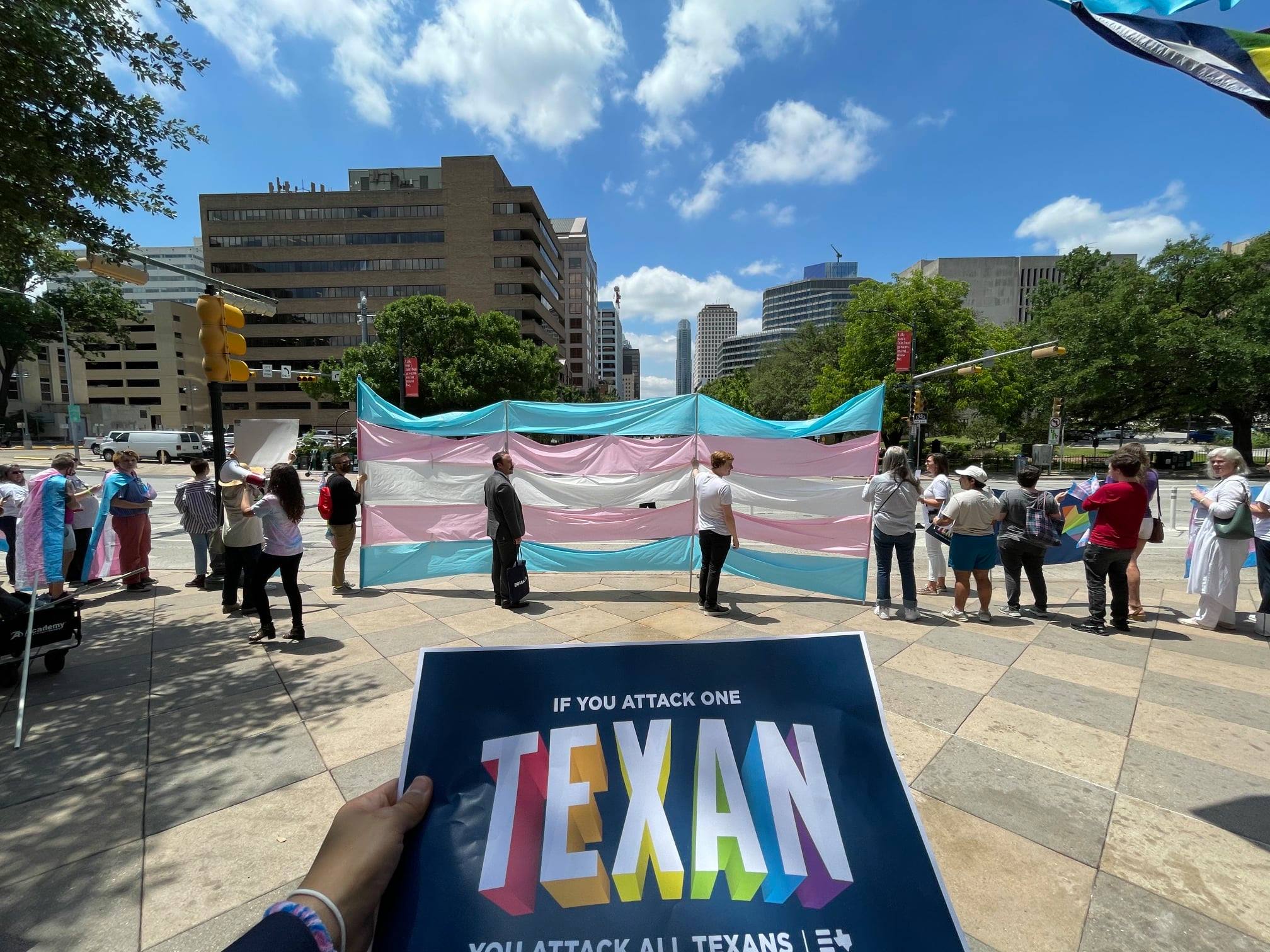
AUSTIN, Texas — On Friday the Texas Court of Appeals, Third District, upheld injunctions in two related cases against the Texas Department of Family and Protective Services (DFPS) barring the DFPS from implementing the agency’s rule expanding the definition of child abuse to presumptively treat the provision of gender-affirming care as child abuse.
The injunctions bar DFPS from implementing the rule by investigating these families based solely on allegations that they are providing gender-affirming care to their adolescents, or taking any action in open investigations other than to close them so long DFPS can do so without making further contact with the families.
Today’s ruling came in two lawsuits, Doe v. Abbott and PFLAG v. Abbott, filed by Lambda Legal, the American Civil Liberties Union Jon L. Stryker and Slobodan Randjelović LGBTQ & HIV Project, the ACLU Women’s Rights Project, the ACLU of Texas, and the law firm of Baker Botts LLP.
“Texas PFLAG families are grateful that the court has once again recognized the harm caused by investigating parents for affirming and loving their transgender kids,” said Brian K. Bond, CEO of PFLAG National. “PFLAG National and our members and supporters will continue leading with love, just as we’ve done for the last 51 years, because when courageous love takes action, our families are stronger, our communities are safer, and our LGBTQ+ loved ones across races, places, and genders thrive.”
In September of 2022, the Travis County District Court issued a third injunction blocking the State of Texas from implementing a directive issued by Republican Governor Greg Abbott that targets trans youth and their families across Texas.
The directive ordered the Department of Family and Protective Services (DFPS) to investigate parents who work with medical professionals to provide their adolescent transgender children with medically necessary healthcare.
The directive could have led to transgender youth being placed in foster care and their parents criminally charged with child abuse—just for following the advice of their physicians and mental health providers.
“We are gratified that the Court upheld the district court’s injunctions protecting families of transgender young people across the state from unlawful investigations under the DFPS rule,” said Paul D. Castillo, senior counsel, Lambda Legal. “The Court recognized yet again that being subjected to an unlawful and unwarranted investigation causes irreparable harm for these families who are doing nothing more than caring for and affirming their children and seeking the best course of care for them in consultation with their medical providers.”
“Transgender youth have always existed and always will, and the vast majority of Texans do not support separating them from their families or taking away their life-saving health care,” said Ash Hall, LGBTQ+ policy and advocacy strategist with the ACLU of Texas. “The maneuvers by Texas state officials against transgender youth are bullying masquerading as policy. Nothing could be further from abuse than parents loving and supporting their transgender children. This decision is another much-needed victory for trans youth and those who love and support them.”
“We are grateful the court saw through this dangerous and transparently discriminatory action by Texas officials,” said Chase Strangio, deputy director for transgender justice at the ACLU’s LGBTQ & HIV Project. “Our clients and countless families like theirs are guided by love and compassion for their transgender youth, following the guidance of their doctors and fighting for the futures their family deserves. These baseless and invasive investigations are a dangerous abuse of the state’s power and one we’re thankful the Texas courts have consistently ruled against.”
Texas
Texas school superintendent suspended over trans actor’s removal
He was suspended in connection with the investigation into efforts to remove a trans senior from the school’s production of Oklahoma!

By Tammye Nash | SHERMAN, Texas – The Sherman Independent School District Board of Trustees, following a closed session meeting on Friday, March 8, has voted to suspend Superintendent Tyson Bennett.
Meghan Cone, the school district’s chief communications officer, confirmed Tuesday, March 12, that Bennett was suspended in connection with the investigation into Bennett’s efforts to remove transgender senior Max Hightower from the school’s production of Oklahoma! Cone said the SISD board had not made nor provided a statement following the vote.
Philip Hightower, Max’s father, said today he is “thrilled that the board made the right decision to protect our kids from discrimination. I’m thrilled Max and the rest can be safe, and I’m proud that our community united and said no to transphobia.”
The board suspended Bennett with pay and appointed Deputy Superintendent Thomas O’Neal as acting superintendent, effective immediately.
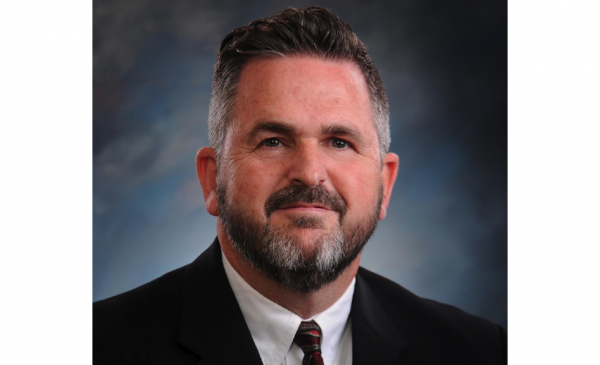
Gordy Carmona, North Texas community engagement and advocacy strategist for Equality Texas, was among those who spoke at the November board meeting where SISD trustees reversed Bennett’s decision to cancel and recast the play. “Hearing Sherman ISD’s decision to recast the Oklahoma! production last year based on a district rule barring students from playing roles that didn’t match their gender assigned at birth was alarming,” Carmona told Dallas Voice today. “Theatre is supposed to be one of the few safe havens for LGBTQIA+ students.
“Thankfully Sherman ISD listened to students, parents and community members concerns,” they continued, “Their reinstatement of the original cast was the first step in correcting some concerning problems within the district. News of the unanimous decision to suspend Superintendent Tyson Bennett was a welcomed surprise, but there is still room for growth in ensuring current and future LGBTQIA+ students can feel fully supported by their district.”
The controversy over the high school play began last October when the high school principal, at Bennett’s direction, contacted parents and students to tell them the planned production was being cancelled. That notification came after Max Hightower was cast in the male role of Aly Hakim, a major character in the play. Several female students were cast in male roles, as well.
In a confusing statement issued Nov. 6, district officials explained that Sherman ISD had no policy regarding how students are cast, except in this one instance and maybe in the future, but then again maybe not: “There is no policy on how students are assigned to roles. As it relates to this particular production, the sex of the role as identified in the script will be used when casting.” A second statement, issued by the district on Nov. 10 supposedly was intended to clear up confusion but really only muddied the waters further.
Bennett’s decision was that for the production to go on after the first of the year, later than originally planned, the show would have to be recast, and he wanted the school’s theater teachers to instead stage a version of the play rewritten for younger students.
But following a marathon board meeting later that month, in which dozens of parents, students and other community members turned out to criticize Bennett and his directives, the Sherman ISD board voted to rescind the directives completely and allow the production to go on as originally cast. The board at that time also removed Bennett’s authority over the school’s fine arts programs and announced an ongoing investigation into the situation.
Sherman High School staged its production of Oklahoma! in January with the original cast, including Max Hightower, in place.
******************************************************************************************

Managing Editor
Nash has been a professional journalist since 1982, and first began working for Dallas Voice in 1988, just four years after the paper was founded. She has worked at both weekly and daily newspapers over the years, but has always worked for community newspapers where the focus is on serving and improving the community you serve.
Nash has won numerous awards over the years for her work, and enjoys working with the other award-winning journalists at Dallas Voice who are as dedicated to the LGBTQ community as she is. Nash lives in Fort Worth with her partner of nearly 20 years, their two sons and their menagerie of pets. She spends her free time on her hobby of photography.
******************************************************************************************
The preceding article was previously by the Dallas Voice and is republished with permission.
Texas
Lawmaker who split with party on LGBTQ+ votes forced into runoff
Thierry angered fellow Democrats because of a speech she gave on the House floor in support of banning gender-transitioning care for minors

By Zach Despart | HOUSTON, Texas – Rep. Shawn Thierry, the Houston Democrat who had angered her party by siding with Republicans on bills opposed by the LGBTQ+ community last year, has been forced into a primary runoff with labor organizer Lauren Ashley Simmons.
With no Republican candidates in the heavily Democratic district, which covers a swath of south Houston anchored by the majority-Black neighborhood of Sunnyside, the winner of the May 28th runoff race is virtually guaranteed to hold the House seat.
The race became a referendum on whether Democrats can remain in good standing with the party if they are not fully supportive of the LGBTQ+ community. Thierry cast two votes opposed by gay and transgender advocacy groups: one restricting certain books at school libraries that led to fears of discrimination about LGBTQ literature and another that banned gender-transitioning care for minors.
While a few other Democrats also supported those bills, Thierry was by far the most vocal in her support. She gave a floor speech in support of the transgender-care bill that shocked fellow Democrats and won her praise from Republicans.
House Democrats also said they were disappointed Thierry did not join their fight to weaken the bills, which could pass in the Republican-controlled Legislature without any Democratic support. On the gender-transitioning care bill, Thierry skipped the votes on all 18 amendments her Democratic colleagues offered.
Thierry said her votes were in line with Black voters in her district who are more socially conservative than white progressives, and who she said represent only a sliver of Democrats. Detractors, including other House Democrats, said the party needs to be united in its commitment to protect LGBTQ+ rights and protect vulnerable Texans.
TEXAS HOUSE DISTRICT 146
Democrat
MAJORITY OF RESULTS HAVE COME IN
An estimated 99% of votes have been counted, according to the Associated Press. No projected nominee has been called yet.
| CANDIDATES | VOTES | PCT. | |
|---|---|---|---|
| D | Lauren Ashley Simmons | 6,255 | 49.5% |
| D | Shawn Nicole Thierry Incumbent | 5,608 | 44.4 |
| D | Ashton P. Woods | 766 | 6.1 |
Source: Associated Press
Republican
✓THIS RACE IS UNCONTESTED.
| CANDIDATES | VOTES | PCT. | |
|---|---|---|---|
| R | ✓Lance York | — | —% |
Source: Associated Press
See results here: (Link)
Thierry’s opponents coalesced around Simmons, who said residents asked her to run after a video of her criticizing the state takeover of Houston ISD exploded in popularity online. Simmons, who has two children in the district, said she worried Thierry was not sufficiently supportive of public education.
Simmons secured some of the marquee endorsements in the race, including labor unions, Planned Parenthood and the influential Houston LGBTQ+ Political Caucus. Democratic Reps. Jessica González, Julie Johnson and Ana-Maria Ramos, backed her, while Barbara Gervin-Hawkins and Nicole Collier endorsed Thierry.
Thierry’s small-dollar donations largely dried up and her reelection campaign relied heavily on wealthy Republican donors. Her contributions included $10,000 from Doug Deason, a conservative activist, and $15,000 from his pro-school voucher Family Empowerment Coalition PAC.
******************************************************************************************
/https://static.texastribune.org/media/profiles/Zach_Despart_HC_TT_02.jpg)
Zach Despart is a politics reporter for The Texas Tribune. He investigates power — who wields it, how and to what ends — through the lens of Texas government. He has extensively covered the Uvalde school shooting, including a groundbreaking investigation on the role the gunman’s rifle played in the disastrous police response. He previously covered Harris County for the Houston Chronicle, where he reported on corruption, elections, disaster preparedness and the region’s recovery from Hurricane Harvey. An upstate New York native, he received his bachelor’s degree in political science and film from the University of Vermont.
The preceding article was previously published by The Texas Tribune and is republished by permission.
*************************************************************************************
Quality journalism doesn’t come free
Perhaps it goes without saying — but producing quality journalism isn’t cheap. At a time when newsroom resources and revenue across the country are declining, The Texas Tribune remains committed to sustaining our mission: creating a more engaged and informed Texas with every story we cover, every event we convene and every newsletter we send. As a nonprofit newsroom, we rely on members to help keep our stories free and our events open to the public. Do you value our journalism? Show us with your support.
Donation Link Here: (Link)
Texas
Texas AG’s effort to persecute families of trans youth blocked
PFLAG received demands from Paxton to turn over documents, communications, & info related to its work helping families with trans adolescents
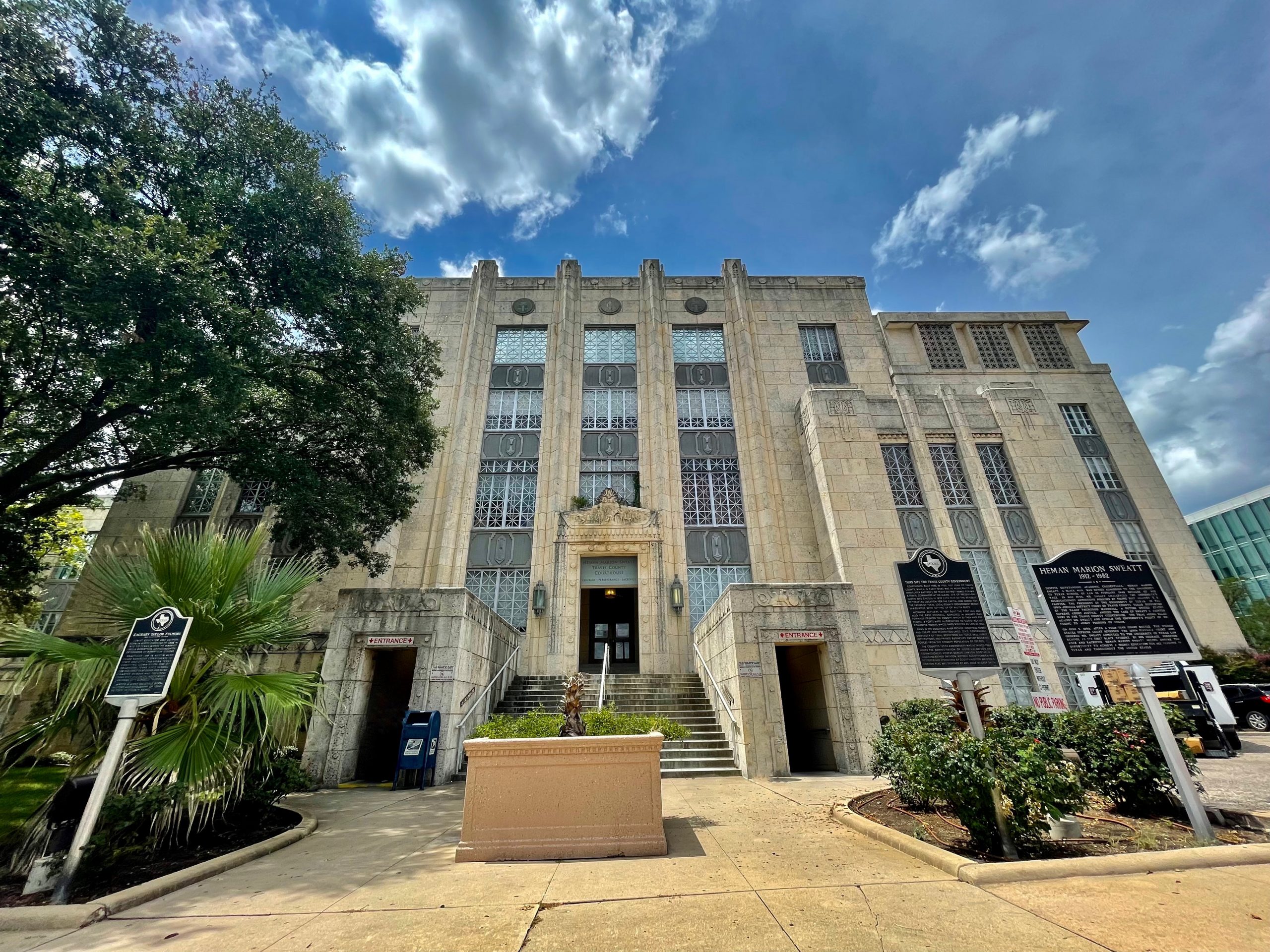
AUSTIN, Texas – Travis County District Court Judge Maria Cantú Hexsel today blocked the latest effort by Texas Attorney General Ken Paxton to persecute Texas families with transgender youth, temporarily halting the Attorney General’s demand that PFLAG, Inc. turn over information and documents about its support of families in Texas seeking gender-affirming medical care for their transgender youth.
PFLAG National, a nonprofit group that supports LGBTQ people and their families, sued the Republican Texas Attorney General late Wednesday in Travis County District Court, arguing that the demand from Paxton’s office was “a clear and unmistakable overreach.”
Lambda Legal, the American Civil Liberties Union of Texas, the ACLU, and Transgender Law Center, who filed a new lawsuit on behalf of PFLAG National and requested a temporary restraining order against the Attorney General’s investigative demands on Wednesday evening, issued the following joint statement:
“We’re grateful that the Court saw the harm the Attorney General’s Office’s intrusive demands posed for PFLAG National and its Texas members — and is protecting them from having to respond while we continue to litigate the legality of the office’s requests. We now will return to court to seek an extended and ultimately permanent block so that PFLAG can continue supporting its Texas members with transgender youth in doing what all loving parents do: supporting and caring for their children.”
On February 9, PFLAG National received civil demands from the Attorney General’s Office to turn over documents, communications, and information related to PFLAG National and the organization’s work helping families with transgender adolescents.
PFLAG National is a plaintiff in two lawsuits filed against restrictions on gender-affirming medical care for adolescents in Texas: one lawsuit Loe v. Texas, challenging S.B. 14, the state’s ban on gender-affirming medical care for minors, and PFLAG v. Abbott, challenging the Texas Department of Family and Protective Services’ (DFPS) rule mandating investigations of parents who work with medical professionals to provide their adolescent transgender children with medically necessary healthcare.
Lambda Legal, the American Civil Liberties Union of Texas, the ACLU, Transgender Law Center, and the law firm Arnold & Porter represent PFLAG, Inc. in this newly filed case.
-

 News2 days ago
News2 days agoWest Hollywood to advance protections for diverse and non-nuclear families
-

 Commentary4 days ago
Commentary4 days agoThe Supreme Court’s ‘Don’t Read Gay’ ruling
-

 Arts & Entertainment3 days ago
Arts & Entertainment3 days ago2025 Emmy nominations: ‘Hacks’ and ‘The Last of Us’ bring queer excellence to the table
-

 a&e features4 days ago
a&e features4 days agoThe art of controlled chaos: Patrick Bristow brings the Puppets to life
-

 Movies3 days ago
Movies3 days ago‘Superman’ is here to to save us, despite MAGA backlash
-

 Sports3 days ago
Sports3 days agoHololive and Dodgers create a home for queer fandom
-

 Events2 days ago
Events2 days agoLos Angeles Blade to take special part in NLGJA Los Angeles inaugural journalism awards
-

 Features8 hours ago
Features8 hours agoTS Madison Starter House offers a blueprint for Black, trans liberation









